- About Us
- Columns
- Letters
- Cartoons
- The Udder Limits
- Archives
- Ezy Reading Archive
- 2024 Cud Archives
- 2023 Cud Archives
- 2022 Cud Archives
- 2021 Cud Archives
- 2020 Cud Archives
- 2015-2019
- 2010-2014
- 2004-2009
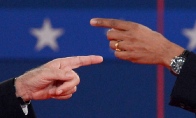 |
October 2012 - Ezy Reading: |
The three Presidential debates are done with and the candidates are headed to the finish line in a flurry of last-minute swing state campaigning and jostling for position. At the time of publication, the candidates are in a near statistical dead heat at the polls and the Oval Office is up for grabs between the incumbent, Democrat Barack Obama, and the challenger, Republican Mitt Romney.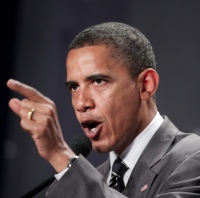
Here are five closing thoughts on the race to the White House as Americans head for the ballot box.
1) Coming into campaign season, if the election was indeed Obama’s to lose, his ‘sleepwalking’ first debate effort will be looked back on as one of the main contributing factors to a Romney Presidency. Had Obama put in a stronger performance and not allowed Romney the chance to, at least in the minds of some Americans, ‘look Presidential’ for the first time, this race may well have already been over.
2) That said, in debates two and three Obama did more than enough to show up Romney, even as the former Governor of Massachusetts largely held his own. But Obama’s successful push-backs against Romney in the second debate on the Libya crisis and his zinger about ‘horses and bayonets’ left a mark and quickly went viral. Though neither rebuke from Obama delivered a knockout punch, they brought Romney back down to earth and made him look decidedly flustered and ineffective.
But Obama’s successful push-backs against Romney in the second debate on the Libya crisis and his zinger about ‘horses and bayonets’ left a mark and quickly went viral. Though neither rebuke from Obama delivered a knockout punch, they brought Romney back down to earth and made him look decidedly flustered and ineffective.
3) As ever, third party candidates failed to get a voice on the national stage. The point isn’t if they could have won (let alone had the resources to do so), it’s that U.S voters lost the opportunity to hear from Obama and Romney on a national stage about other issues that matter. Instead, both parties largely set rigid agendas for this campaign and have rarely stepped outside of those subject lines. We have not seen, for instance, any meaningful discussion during the campaign from either candidate on the matter of climate change. Jill Stein would have had something to say about that.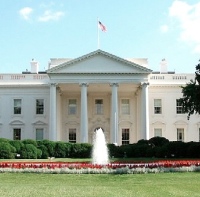
4) Romney clearly has a significant legion of true believers, but it’s by no means unreasonable to raise questions on as to what exactly it is that Romney himself believes in (other than the Mormon faith). Over the years his political ideology has regularly swung from the far right to more centrist positions, not limited to but including such issues as a woman’s right to choose, the Lilly Ledbetter Fair Pay Act, America’s commitment to the wars in Iraq and Afghanistan, universal healthcare, relations with China and how to best handle the embattled U.S auto industry. Voters can’t be blamed for wondering if Romney isn’t so much ‘adaptable and open to bipartisanship’ as someone who is not merely contradictory, but an outright opportunist willing to say whatever it takes at any given time to advance his own career. He has certainly done his share of pandering to the more extreme wings of the Republican Party (see his previous assertions on contraception, the regular fear mongering about nuclear Iran and talk of ‘the 47%’), 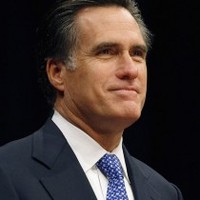 and in the last debate Romney clearly tempered his rhetoric in an attempt to appear more centrist and appealing to women voters. But moderate or not, lower income Americans can’t have much confidence in the man after his now famous ‘47%’ gaffe or about the fact he’s a millionaire former banker who made a career out of decisions that potentially cost thousands of people their jobs in the pursuit of profit. A President surely has to make tough, sometimes unpopular decisions, but it shouldn’t be much of a surprise to discover that someone with Romney’s professional background considers it a bad move to tax America’s wealthiest citizens any further. All this and we haven’t even gotten to assessing his budget plan which promises to ‘turn America around’ without offering up much in the way of specifics beyond raising military expenditure and cutting funding to PBS and teachers. But at the end of the day the biggest indictment against Romney is indeed his inconsistency. It’s one thing to campaign inconsistently, but once an individual holds the office of President and is willing to bend, change and alter their views in line with popular opinion, they aren’t just being indecisive, they become downright dangerous. Principle must always govern over ambition, and the honesty and integrity of Romney’s principles aren’t always a sure thing.
and in the last debate Romney clearly tempered his rhetoric in an attempt to appear more centrist and appealing to women voters. But moderate or not, lower income Americans can’t have much confidence in the man after his now famous ‘47%’ gaffe or about the fact he’s a millionaire former banker who made a career out of decisions that potentially cost thousands of people their jobs in the pursuit of profit. A President surely has to make tough, sometimes unpopular decisions, but it shouldn’t be much of a surprise to discover that someone with Romney’s professional background considers it a bad move to tax America’s wealthiest citizens any further. All this and we haven’t even gotten to assessing his budget plan which promises to ‘turn America around’ without offering up much in the way of specifics beyond raising military expenditure and cutting funding to PBS and teachers. But at the end of the day the biggest indictment against Romney is indeed his inconsistency. It’s one thing to campaign inconsistently, but once an individual holds the office of President and is willing to bend, change and alter their views in line with popular opinion, they aren’t just being indecisive, they become downright dangerous. Principle must always govern over ambition, and the honesty and integrity of Romney’s principles aren’t always a sure thing.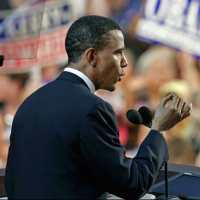
5) Obama’s presidency has also been plagued by inconsistency to say the least. Few could claim that Obama has reached the heights of success that were expected of him upon sweeping into office four years ago. Republicans are clearly tired of hearing about the past, but even years on it still cannot be overstated enough that Obama inherited incredible woes from the previous administration, including the worst economic depression in eighty years and two wars. Obama never had the teeth to bully his way in like his predecessor could, when Bush claimed, on his re-election, that he now had a mandate and “I intend to use it”. After eight challenging years with Bush in charge, many liberals claim that they wanted Obama to act in a more heavy-handed, more liberal manner as leader, but it seems that these critics forgot he campaigned on a gentler, more progressive platform of ‘hope and change’, not aggressive agenda-pushing. Even so, today’s version of Obama is far more prickly and defensive, his skin hardened from years of attacks by a relentless opposition unwilling to even remotely entertain bipartisanship, attacks from within his own party over what they called alienating, alarming breaches of principle on matters like Guantanamo, illegal immigration and the use of drones, as well as unrelenting critique from out-and-out extremists in the talk-radio set, and the fading ‘birther’ and Tea Party movements (many of whose attacks have always been tinged with ugly elements of racism). By the same token it is always far harder for an incumbent to run against his own record than to run on nothing at all–Obama has been learning this the hard way in recent months. And yet for all his shortcomings, he has still achieved a great deal. Though the end product was not all he had hoped it could be and was lacking in any Republican support, Obama nonetheless managed to pass the Patient Protection and Affordable Care Act in 2010. He presided over America’s withdrawal of troops from Iraq and Afghanistan, the death of Osama Bin Laden and the removal from power of Muammar Gaddafi. Obama directly aided the recovery of the Detroit automotive industry, he has enacted significant education reform, he certified the repeal of ‘Don’t Ask, Don’t Tell’, and, slowly but surely, has seen his job-creation numbers improve. Criticize Obama all you want, but in a political office where decisions are never easy, matters are never as simple as black and white, and compromise is a constant reality, on the evidence he has at least clung to enough of his principles and core beliefs. We might not be able to wholly understand or even forgive some of Obama’s failures and broken promises, but he has always circled back somewhere else during his Presidency to a platform that is at least, much of the time, consistent. In politics, sometimes we have to accept that ‘some of the time’ is better than ‘none of the time’, especially in the face of massive opposition, and at the very least it is better than knowing nothing at all, which is exactly the conundrum so many voters will still be feeling about Romney come election day.
illegal immigration and the use of drones, as well as unrelenting critique from out-and-out extremists in the talk-radio set, and the fading ‘birther’ and Tea Party movements (many of whose attacks have always been tinged with ugly elements of racism). By the same token it is always far harder for an incumbent to run against his own record than to run on nothing at all–Obama has been learning this the hard way in recent months. And yet for all his shortcomings, he has still achieved a great deal. Though the end product was not all he had hoped it could be and was lacking in any Republican support, Obama nonetheless managed to pass the Patient Protection and Affordable Care Act in 2010. He presided over America’s withdrawal of troops from Iraq and Afghanistan, the death of Osama Bin Laden and the removal from power of Muammar Gaddafi. Obama directly aided the recovery of the Detroit automotive industry, he has enacted significant education reform, he certified the repeal of ‘Don’t Ask, Don’t Tell’, and, slowly but surely, has seen his job-creation numbers improve. Criticize Obama all you want, but in a political office where decisions are never easy, matters are never as simple as black and white, and compromise is a constant reality, on the evidence he has at least clung to enough of his principles and core beliefs. We might not be able to wholly understand or even forgive some of Obama’s failures and broken promises, but he has always circled back somewhere else during his Presidency to a platform that is at least, much of the time, consistent. In politics, sometimes we have to accept that ‘some of the time’ is better than ‘none of the time’, especially in the face of massive opposition, and at the very least it is better than knowing nothing at all, which is exactly the conundrum so many voters will still be feeling about Romney come election day.
Ezy Reading is out every month...
